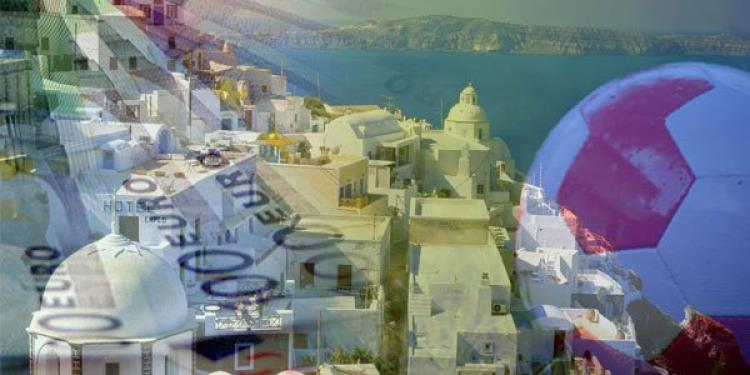Greek Sportsbetting: Only One Game in Town
Posted: January 28, 2014
Updated: October 4, 2017

European integration moves forward but the Greek sportsbetting market is stubbornly resistant.
Sportsbetting has enjoyed a high degree of popularity in Greece for a long time, as it has in most of the world. Bettors particularly enjoy placing wagers on football matches. The Greek Organization of Football Prognostics (OPAP) was founded in 1958 as a state-owned company offering betting services. Anyone who wanted to legally bet on sports in Greece had to go through OPAP.
OPAP has been well-documented in recent years. The company has been the country’s dominant provider of land-based betting services since its founding in 1958. While many hoped that the online gambling revolution would lead to increased market competition, the Greek state has stepped in to make sure that doesn’t happen.
Internet betting in Greece was relatively open for some time. Interim licenses were granted and some foreign operators enjoyed a lot of success. This changed in 2012 when the government stopped renewing licenses, and OPAP became the only provider which could legally offer betting services in the country. In addition to its betting shop monopoly, it received the same status in the online market as well.
A Balkanized Gambling Market In the Economic Union
The European Union is supposed to function as a single economy, with goods, services, capital and labor flowing freely across national borders. The cross-border movement of gambling services is a sticky issue. While it is officially protected by Article 56 of the Treaty on the Functioning of the European Union, member states have the freedom to make their own rules in the name of public interest, and if those rules are applied consistently and fairly.
Numerous countries in Europe have received complaints and requests from the European Commission (EC) about their national gaming regulations. While Greek gambling laws interfere with the goals of the single economy more than those of any other member state, the country has managed to escape punishment from the EC.
While Greece has the right to make its own regulations, it has violated the spirit of Article 56 by applying regulation unfairly. No reason was given when the government refused to renew licenses. In addition, the monopoly firm OPAP was partially state-owned until 2013, and experienced significant declines in profit over the past few years, dropping 73.9 percent in 2013 from the previous year.
OPAP has been extremely poorly managed and appears to have served no other purpose than to line the pockets of certain interested politicians. Also, the fact that a 15 percent tax was imposed on all winnings by bettors looks like regulations are not intended for the benefit of the public.
Sportsbetting in Greece
A formal sportsbook monopoly was born in Greece in 1996 when the government issued an exclusive license to OPAP. This was right as online gambling was in its infancy, so the regulations dealt with land-based betting shops. OPAP was already dominant in the market, but granting it an exclusive license ensured that it would be protected from future competition. Greeks love to gamble, especially on football. OPAP became the world’s largest bookie, and the black market for sports betting flourished alongside it.
The online sportsbetting phenomenon has taken hold in Greece as it has everywhere else. The government originally extended interim licenses to several foreign sportsbooks. Major online sportsbooks in Greece included Sportingbet, the large UK-based company. For some time OPAP was a monopoly in betting-shops but faced competition in the online market.
Controversy ensued in 2012 when the Greek government extended an online license to OPAP while announcing that it would allow the interim licenses to expire. In effect this extended OPAP’s monopoly on betting-shops to the internet as well.
On the announcement several bookmakers chose to pack up and leave. These include William Hill, 365Bet, BetFair, and the aforementioned Sportingbet. Complaints have been filed with the EC that Greek actions are clearly in violation of Article 56, but no measures have been taken to break up the monopoly.
In early 2013 the government sold its 33 percent stake in OPAP to Emma Delta, a partnership fund of Greek and Czech investors. Many speculated that the government elevated OPAP to monopoly status in order to increase its profitability and increase its sale price. Emma Delta paid roughly $870.52 million for it.
The RGA’s Crusade Against the Greek Monopoly
The Remote Gambling Association (RGA), a trade group which promotes free movement of gaming services across national borders, has attempted to take Greece to task over the violations of Article 56. However, the EC does not appear interested in the situation in Greece, and has not opened any proceedings against them.
RGA President Chris Hawkswood had this to say:
“In granting OPAP an online monopoly without complying with the Treaty [on the functioning of the European Union] the government may have to compensate companies who had a legitimate expectation that they would be able to apply for concession. They may also have to refund investors in OPAP who had been led to believe that OPAP did have a monopoly.”
He also stressed that regulations are against the public interest because the state loses tax revenue by keeping foreign bookmakers out. In addition, the poor odds offered to bettors leads many of them to go outside of the country to place bets.
Sportsbetting in Greece going forward
Now that OPAP is a fully privately owned company, will regulations be changed to allow competition in the Greek market? New licenses have not been issued, even though it has been half a year since the sale. The RGA has lodged complaints, but currently the EC is not interested in taking Greece to task. Things my change in the future, but as of now it does not look good for Greek sportsbettors or foreign bookmakers interested in the market.












